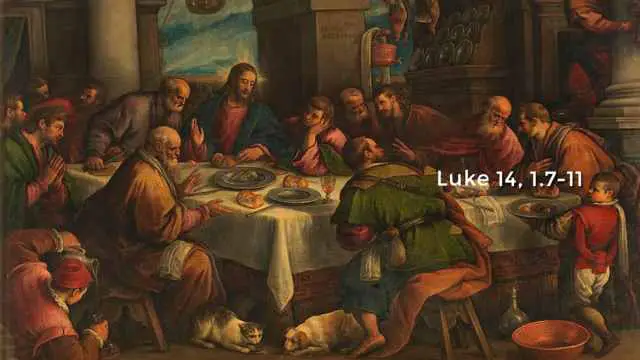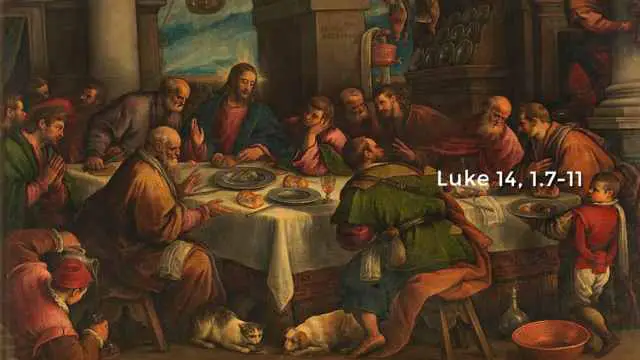As a spiritual text, the Bible is often filled with complex stories and parables that can be difficult to understand. One such story is found in the book of Luke, chapter 14, verses 1-14. In this passage, Jesus is invited to dine at the house of a prominent Pharisee, and he uses the opportunity to teach his followers important lessons about humility, hospitality, and true righteousness.
In this article, we will delve deeper into Luke 14:1-14 and explore its meaning and commentary. We will break down the passage into five sections, each exploring a different aspect of Jesus’ teachings. So grab your Bible and let’s dive in!
Luke 14:1-14

One Sabbath, when Jesus went to eat in the house of a prominent Pharisee, he was being carefully watched. 2 There in front of him was a man suffering from abnormal swelling of his body. 3 Jesus asked the Pharisees and experts in the law, “Is it lawful to heal on the Sabbath or not?” 4 But they remained silent. So taking hold of the man, he healed him and sent him on his way.
5 Then he asked them, “If one of you has a child or an ox that falls into a well on the Sabbath day, will you not immediately pull it out?” 6 And they had nothing to say.
7 When he noticed how the guests picked the places of honor at the table, he told them this parable: 8 “When someone invites you to a wedding feast, do not take the place of honor, for a person more distinguished than you may have been invited. 9 If so, the host who invited both of you will come and say to you, ‘Give this person your seat.’ Then, humiliated, you will have to take the least important place. 10 But when you are invited, take the lowest place, so that when your host comes, he will say to you, ‘Friend, move up to a better place.’ Then you will be honored in the presence of all the other guests. 11 For all those who exalt themselves will be humbled, and those who humble themselves will be exalted.”
12 Then Jesus said to his host, “When you give a luncheon or dinner, do not invite your friends, your brothers or sisters, your relatives, or your rich neighbors; if you do, they may invite you back and so you will be repaid. 13 But when you give a banquet, invite the poor, the crippled, the lame, the blind, 14 and you will be blessed. Although they cannot repay you, you will be repaid at the resurrection of the righteous.”
Luke 14:1-14 Meaning and Explanation

Luke 14:1-14 contains two distinct but related teachings of Jesus. In the first part (verses 1-6), Jesus heals a man suffering from dropsy on the Sabbath, challenging the religious leaders’ legalistic approach to the Sabbath law. In the second part (verses 7-14), Jesus tells a parable about guests at a wedding feast, teaching about humility and generosity.
In the healing miracle, Jesus challenged the Pharisees and experts in the law who were watching him closely, questioning whether it was lawful to heal on the Sabbath. Jesus uses this opportunity to demonstrate that love and compassion should always take precedence over rigid adherence to rules. By healing the man on the Sabbath, Jesus emphasizes the importance of mercy and kindness, highlighting that the true spirit of the law is rooted in love for others.
The parable of the wedding feast illustrates the principle of humility. Jesus observes how guests at a banquet vie for places of honor, cautioning against seeking recognition and status. He advises choosing a lower place at the table so that the host may then honor the guest by moving them to a higher position. This act of humility reflects Jesus’s broader teachings on the Kingdom of God, where the last shall be first and the first shall be last.
Furthermore, Jesus encourages his listeners to invite those who cannot repay them, rather than inviting only friends, relatives, or the wealthy. By doing so, they would experience the joy of selfless giving and embody the spirit of true hospitality. This teaching challenges societal norms and underscores the value of showing kindness and generosity without expecting anything in return.
Overall, Luke 14:1-14 conveys the message of genuine love, humility, and selfless generosity. It calls for a shift away from self-centeredness and pride toward a life characterized by compassion, humility, and inclusive love for all, regardless of social status or ability to reciprocate. These teachings remain relevant today, reminding us to prioritize love and kindness in our interactions with others.
The Setting: A Dinner With a Purpose (Luke 14:1-6)

To fully understand the meaning behind Jesus’ teachings in Luke 14:1-14, we must first set the scene. The passage begins with Jesus being invited to dine at the house of a prominent Pharisee on the Sabbath day. This was a common practice during the time, as it was considered an honor to host a teacher like Jesus.
However, we soon discover that the dinner invitation was not just an act of kindness. The Pharisees were watching Jesus closely, hoping to catch him breaking any of their strict Sabbath rules. And they were not disappointed.
Breaking the Rules to Help Others
Upon entering the house, Jesus noticed a man suffering from dropsy, a condition where the body retains excess fluid. He also noticed how the other guests were trying to find a reason to accuse him of breaking the Sabbath law by healing the man. But Jesus, knowing their thoughts, asked them, “Is it lawful to heal on the Sabbath, or not?” (Luke 14:3).
When they remained silent, Jesus went ahead and healed the man, perfectly illustrating his point that doing good and helping others should never be restricted by man-made rules. This act of healing on the Sabbath was seen as a direct challenge to the authority of the Pharisees, who were known for their strict adherence to the law.
The Importance of Humility
In this section of the passage, Jesus also teaches about the importance of humility. He observes how the guests at the dinner were jostling for the best seats, seeking honor and recognition from one another. So, Jesus tells them a parable about a wedding feast, where it is better to take the humble seat and be invited to a higher position rather than exalt yourself and be humbled (Luke 14:7-11).
Through this parable, Jesus teaches us that true humility is not about thinking less of ourselves, but rather not thinking of ourselves at all. And he emphasizes that God will exalt those who humble themselves, while those who exalt themselves will be humbled.
A Lesson on Hospitality (Luke 14:7-14)

After teaching about humility, Jesus shifts his focus to hospitality in verses 12-14. Once again, he uses a parable to illustrate his point, this time about a man hosting a banquet who invites only his wealthy friends and family. But Jesus challenges this notion of hospitality by suggesting that instead of inviting those who can repay you, we should invite the poor, crippled, blind, and lame, who cannot repay us.
The True Meaning of Hospitality
In this section, Jesus is not dismissing the importance of inviting our loved ones and friends to our homes. Instead, he is reminding us that true hospitality is not about receiving something in return, but rather showing love and generosity to those who are often overlooked and marginalized in society.
Jesus also points out that when we invite those who cannot repay us, we will be blessed in the resurrection of the righteous. This is a reminder that our acts of hospitality are not in vain and will be rewarded by God in the end.
Table Manners in the Kingdom of God
Jesus further expands on this idea of hospitality by using it as an analogy for the kingdom of God. He explains that when we invite those who are often excluded from society, we are not just showing kindness, but we are also reflecting the character of God in our own lives.
In contrast, when we only show hospitality to those who can benefit us, we are not living according to the values of the kingdom of God, where true righteousness is found in selfless love and service to others.
The Parable of the Great Banquet (Luke 14:15-24)

The next section of Luke 14:1-14 features another parable, this time about a great banquet. In this story, a man hosts a feast and invites many guests, but they all make excuses and decline the invitation. So, the host sends his servant to invite the poor, crippled, blind, and lame to fill the seats at the table.
This parable has two main lessons that Jesus wants his followers to understand.
The Rejection of the Invitation
Firstly, the initial guests who were invited but declined the invitation represent the Jewish people who had been God’s chosen people. Throughout the Old Testament, God had extended an invitation to the Israelites to join him in his kingdom, but they continually rejected it through their disobedience and rejection of the prophets.
Sadly, this pattern of rejection continues even when the Son of God himself comes to extend the invitation. Many of the Jewish leaders and people reject Jesus’ message and ultimately, reject the kingdom of God.
The Invitation to All
The second lesson of this parable is that the invitation to the great banquet is open to all, not just the Jews. By sending out his servant to invite the poor and marginalized, the host symbolizes how Jesus came to bring salvation to all people, regardless of their background or status.
This was a radical concept at the time, as the Jews believed that they were the chosen people of God and that salvation was only for them. But Jesus’ message of inclusivity and acceptance shattered these beliefs and opened the way for Gentiles and all people to be welcomed into the kingdom of God.
Counting the Cost (Luke 14:25-35)
In this section, Jesus addresses the large crowds who were following him and lays down the requirements for being his disciple. He uses strong language to emphasize the seriousness of his message, saying that to be his disciple, one must hate their family and even their own life, carry their cross, and give up all possessions (Luke 14:26-33).
The High Cost of Discipleship
Jesus is not telling us to literally hate our families. Instead, he is using hyperbolic language to convey that our love and devotion to him should surpass our love for anything else. He is also warning us that following him will not be an easy journey, but it will require sacrifice and self-denial.
As followers of Christ, we are called to count the cost of discipleship and be willing to give up everything for the sake of the kingdom of God. This does not mean that we cannot enjoy good things in life, but rather that we must hold them with open hands and be willing to let go if God asks us to.
Salt and Light for the World
Jesus concludes this section with another analogy, comparing his followers to salt and light. Both salt and light have essential roles in preserving and bringing flavor to the world. In the same way, we are called to be salt and light to those around us, bringing the goodness and truth of God’s kingdom to a world in need.
Jesus warns that if we lose our saltiness or hide our light, we will no longer be effective in fulfilling our role in God’s kingdom. This is a reminder for us to continually check our hearts and actions to ensure that we are living out the teachings of Jesus and being true disciples.
Conclusion: Lessons Learned from Luke 14:1-14
As we come to the end of this article, it is essential to reflect on the lessons we can learn from Luke 14:1-14. Through this passage, Jesus teaches us about the importance of humility, hospitality, inclusivity, and counting the cost of discipleship. He challenges us to examine our motives and priorities and invites us to fully surrender ourselves to him as his disciples.
Jesus’ message in Luke 14:1-14 is just as relevant today as it was when he first spoke it. As we strive to follow his teachings, may we remember to always extend an invitation of love and grace to those around us, just as he has done for us.

Faithway.info, your online sanctuary for deepening your spiritual journey and mastering the teachings of the Bible. At Faithway.info, we are passionate about making the wisdom of the Bible accessible to everyone, fostering a community dedicated to growth, understanding, and support.
